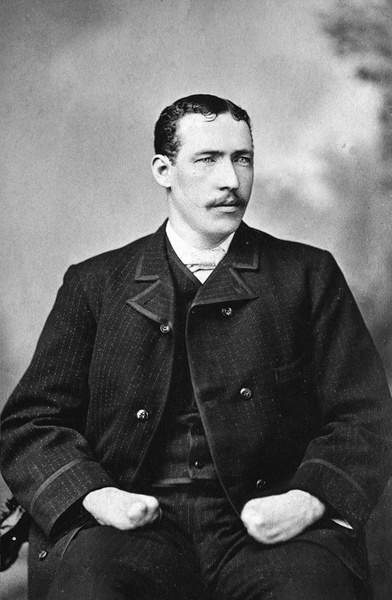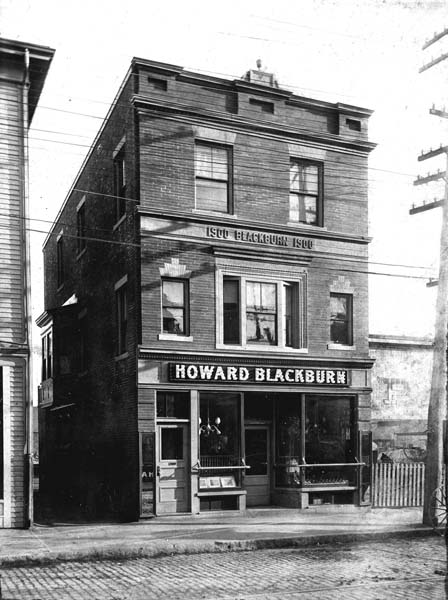Captain Howard Blackburn, the Lone Voyager

A Desperate Journey
A native of Nova Scotia, Howard Blackburn was fishing out of Gloucester for halibut from the schooner Grace L. Fears in January 1883 when his life was forever changed—and his place in Cape Ann history sealed. While working on Burgeo Bank, a winter storm came up suddenly, stranding Blackburn and his crew mate, Thomas Welch, in their open dory. Blackburn lost his heavy fisherman's mittens overboard and knowing that his hands would freeze, held them in a curved position that would allow him to slip his frozen hands back over the oars. Five days later—days virtually without food, water or sleep—Blackburn had rowed to the shore of Newfoundland. Welch had died on route. Blackburn was taken in by a family who sheltered him for the winter and tended to his injuries as best they could. His frostbitten hands and feet were soaked in a brine solution, then treated with poultices of flour and cod liver oil. Despite their efforts, Blackburn lost all of his fingers, both thumbs to the first joint and a toe.
Against all odds, come spring Howard Blackburn returned to Gloucester a hero, someone who had fought the sea for the highest stakes and won. As Blackburn was unable to continue fishing, sympathetic townspeople raised $500 to help him get back on his feet. With part of the money he opened a cigar store and soon after applied for a liquor license.
The Blackburn Tavern
The liquor license was granted in 1888, but an impatient Blackburn had eased into the saloon business in 1886. He continued to serve liquor during the years that followed, while the town periodically voted itself dry. Despite the problems that resulted from being a sometimes bootlegger, Blackburn and his business flourished. The story of Blackburn’s miraculous survival spread quickly, and the saloon was popular with townspeople and seafarers alike. Howard Blackburn was a bona fide hero, a larger than life character with great stories to tell.

Following the Gold Rush
Not content to live a quiet life, Howard Blackburn embarked on a series of adventures that added to his notoriety. In 1897, he caught gold fever and organized an expedition to the Klondike. Rather than follow the crowd overland, Blackburn and his party sailed south around Cape Horn, then back up the West Coast to the Yukon. Although Blackburn and his crew reached their destination, the business venture ended in failure.
Solo Atlantic Crossings
Back in Gloucester and looking for a new challenge, Blackburn started planning his first solo crossing of the Atlantic. It had been done before—the first time by Gloucester's Alfred "Centennial" Johnson in 1876—but never by a man with no fingers. In 1899, Blackburn sailed the Gloucester sloop Great Western to England in 62 days. The Cape Ann Breeze called him the "Man of Iron."
By 1900, Howard Blackburn was one of Gloucester's most important businessmen, donating generously to charities and replacing his first saloon with a fine brick building. The last remaining portion of the mahogany bar top from that establishment can be seen in the Cape Ann Museum Library. That same year, Blackburn decided to make a second solo crossing. He sailed the Great Republic to Portugal in 1901, setting a new record of 39 days. The Gloucester sloop Great Republic can be seen in one of the Cape Ann Museum's maritime galleries.
Later Life
Twenty years after he almost lost his life in a dory, Howard Blackburn decided to take on the sea again in a small boat, this time the Swampscott sailing dory America. He sailed out of Gloucester in 1903, intending to cross and re-cross the Atlantic, only to be defeated by foul weather and his own physical infirmities. Time and early hardships had taken their toll, and Prohibition brought new business problems in the 1920s, but Blackburn never lost his zest for adventure. In 1931, at the age of 72, he began talking about another solo sail of the Atlantic, this time in Cruising Club.
Blackburn died a year later. His funeral procession on Main Street included hundreds of people. The "Man of Iron" was buried in the Fishermen's Rest section of Beechbrook Cemetery in West Gloucester.
(above) Portrait of Howard Blackburn, ca. 1884-85. Taken by Patten, Perkins & Stratton, 47 Hanover St., Boston, MA. Collection of the Cape Ann Museum. (below) Howard Blackburn's Tavern, and home, 289-91 Main Street, Gloucester, MA. Designed by architect Ezra Phillips in 1900. Photo c.1910.